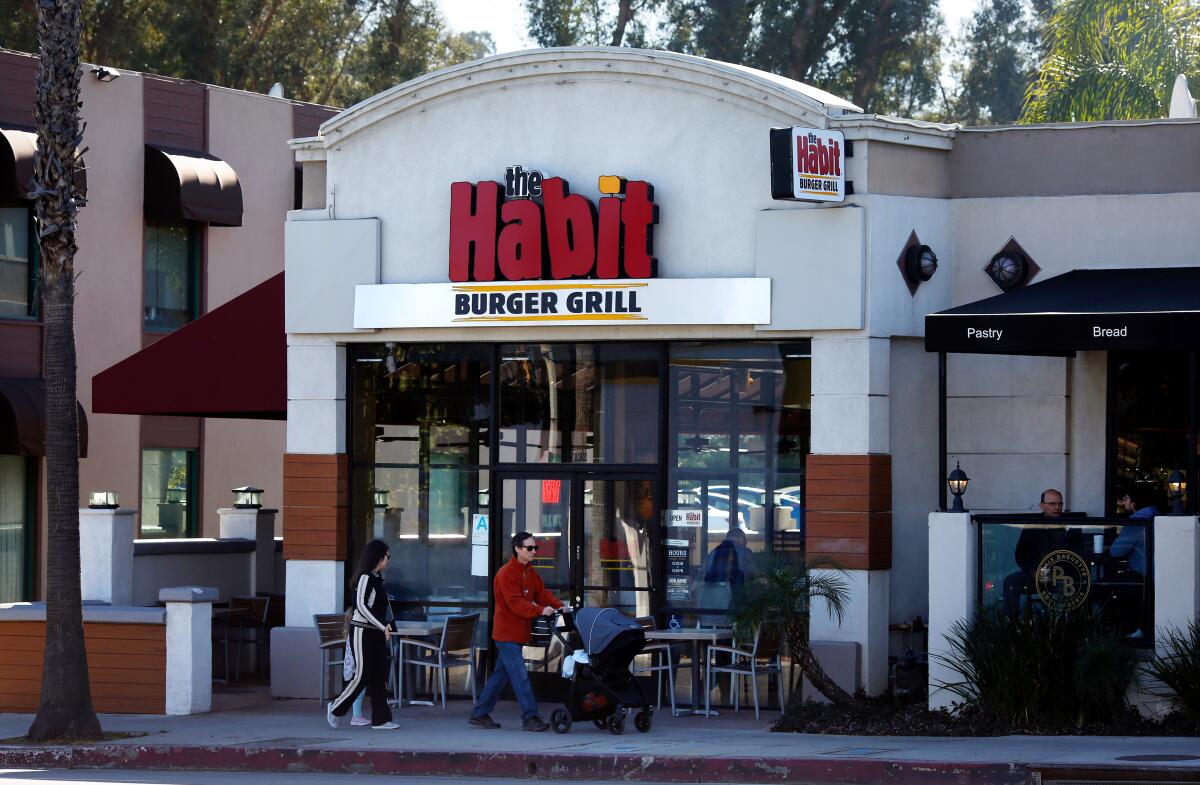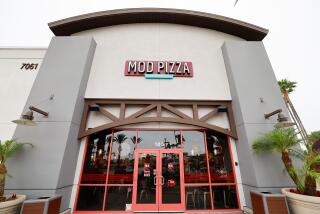Yum Brands is buying Habit Burger Grill for $375 million

Half a century ago, a restaurant opened in Santa Barbara that sold burgers for 24 cents each.
That restaurant later became known as the Habit Burger Grill and has expanded to nearly 300 locations — most of them company-owned — in the United States and China. Over the years, Habit has added to its menu, supplementing its burger mainstays with steak, chicken and ahi tuna sandwiches.
Now the chain is set to join Taco Bell, Pizza Hut and KFC as part of fast-food conglomerate Yum Brands Inc., which announced Monday that it plans to acquire Habit Restaurants Inc. in a $375-million deal.
The acquisition will enable Habit to tap into the colossal Yum’s resources, said Habit Chief Executive Russell Bendel, who will remain in his role after the deal closes.
“It really allows for the Habit brand and our people to be able to continue to grow and help the brand continue on its journey,” he said.
Habit Burger represents a new niche for Yum: fast-casual. The format, typically more expensive than McDonald’s and Burger King, still has drive-through windows and competes with chains such as Shake Shack and Five Guys. Habit has also added self-service kiosks.
The acquisition is expected to close by the end of the second quarter. Habit Restaurants will keep its headquarters in Irvine — just miles from the headquarters of Yum’s Taco Bell — with Bendel reporting to Yum CEO David Gibbs. When asked about layoffs, Habit said that there would be no immediate changes but that it was too soon to talk about long-term plans.
Habit has seen tremendous growth since its beachy beginnings in 1969.
A 16-year-old named Brent Reichard got a job flipping burgers there, and four years later, in 1980, he and his brother Bruce bought the place. By 2007 the restaurant had become a 24-location chain, and an investment group led by private investment firm Karp Reilly took a majority stake in the business.
In 2011, Habit expanded beyond California, opening a restaurant in Phoenix.
The company’s growth really took an upturn in 2014, the year it went public. Habit opened locations on the East Coast and started looking to expand abroad. It now has more than 200 restaurants in California alone.
Since opening its first restaurant in China in 2017, Habit has expanded its presence in that country to seven locations and has seen interest from other potential international franchisees. The chain is also opening restaurants in Cambodia.
“With the demographics of California and commerce between the West Coast and Asia and their affinity for Western brands, it just made a lot of sense for us to work with somebody there,” Bendel said.
Yum spun off its China division, Yum China Holdings Inc., in 2016, and the operator is one of that nation’s largest restaurant companies.
The Habit deal, which will be financed with cash and available credit, also reflects the increasingly crowded U.S. restaurant market. The fast-casual format continues to grow in appeal as fast-food chains vie for customers with steep discounts and as higher labor costs compress profit margins. Yum sees Habit growing mostly with franchising, Gibbs said, and will tap into its existing franchisee base to open new stores.
Yum has shown willingness to buy and invest in other companies in recent years: It purchased a stake in delivery specialist Grubhub Inc. in 2018 and acquired QuickOrder, which makes software for online ordering. In August, Gibbs said Yum would consider acquiring another restaurant chain, adding that the company would look for a popular brand that had “lots of growth ahead of it.”
Habit is dwarfed by Yum’s other brands, but there are benefits to buying a smaller chain, Sanford C. Bernstein analyst Sara Senatore said.
“Yum has been intimating that it would be receptive to an acquisition,” she said in a note. “We believe starting small is appropriate to mitigate risk and prove out the company’s ability to successfully integrate and grow a concept.”
Shares of Habit leaped 32.3% on Monday. Yum’s stock slipped less than 0.1%.
Masunaga is a Times staff writer. Patton writes for Bloomberg.
More to Read
Inside the business of entertainment
The Wide Shot brings you news, analysis and insights on everything from streaming wars to production — and what it all means for the future.
You may occasionally receive promotional content from the Los Angeles Times.











